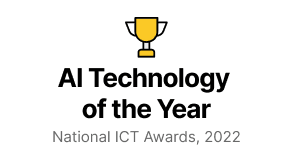2025-02-01
Artificial Intelligence is revolutionizing healthcare, transforming every aspect of healthcare delivery. The increasing availability of multi-modal data coupled with complex AI models that can learn from such data has facilitated early detection, faster medical diagnostics, personalized treatment plans, and data management.
The integration of AI in healthcare is not just a trend but a paradigm shift, enhancing the work done by medical professionals and ensuring better, faster, and more reliable healthcare services for patients worldwide.
AI Assistance in Diagnostics
Chronic diseases often go undiagnosed due to the heavy demands on healthcare providers, making it challenging to deliver comprehensive care. Deep learning technologies, particularly Convolutional Neural Networks (CNNs), play a crucial role in analyzing medical images and identifying disease patterns within datasets. This early identification of diseases can significantly slow, prevent, or even halt disease progression.
For example, at Hackensack Meridian Health, AI has been integrated into clinical workflows to assist primary care providers in detecting conditions like stage 3 chronic kidney disease, resulting in improved patient outcomes.
AI in Patient Engagement and Virtual Assistance
AI is revolutionizing patient engagement and virtual healthcare through advanced chatbots and virtual assistants. With recent advancements in Large Language Models (LLMs) and continuous improvements in machine learning algorithms, AI provides personalized information, medical advice, and appointment scheduling. By integrating with Electronic Health Records (EHRs) and utilizing voice recognition, AI enhances accessibility and ensures real-time support.
Automated monitoring and predictive analytics support health management, reducing provider workload and improving patient outcomes.
AI in Healthcare Data Management
AI is transforming healthcare data management by efficiently integrating and analyzing vast amounts of diverse data, breaking down traditional silos, and uncovering meaningful insights. This enhances diagnostic accuracy, personalizes treatment plans, and improves patient welfare.
AI also streamlines administrative tasks, reducing costs and allowing healthcare providers to focus more on patient care.
AI in Clinical Laboratory Testing
Advanced neural network models in AI can detect, identify, and quantify microorganisms and predict clinical outcomes using genomic data and microscopic imaging. These AI-driven tools can detect minute anomalies and patterns that might be overlooked by human analysis, leading to earlier and more precise diagnoses.
For example, AI has been successfully integrated into hematology and microbiology labs to automate the identification of blood cells and pathogens, reducing the need for manual review and speeding up the diagnostic process.
Conclusion
AI fundamentally transforms the healthcare industry by enhancing diagnostics, patient engagement, data management, and laboratory testing. From early disease detection and personalized treatment plans to streamlined administrative tasks and improved patient outcomes, AI-driven solutions are making healthcare more efficient, reliable, and accessible. As technology advances, AI's role in healthcare will become increasingly essential, enabling medical professionals to deliver better care and improving the overall quality of healthcare services worldwide.






